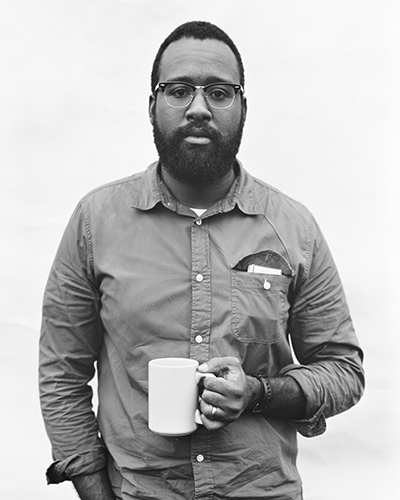
Zora J. Murff, a graduate student in photography in the Department of Art and Art History, will present a free public lecture about his "Corrections" series on Wednesday, Jan. 27 at 5:30 p.m. in Richards Hall Rm. 15 on the UNL city campus.
For three years, Murff provided monitoring and rehabilitation services to youth on probation in Eastern Iowa. Combining his work in human services and photography, he documented the young men and women in his charge. The result is his series "Corrections," an examination of youth experience in the juvenile justice system, the role images play in defining kids who are deemed criminals, and how the concepts of privacy and control may affect their future.
His monograph, "Corrections," was published in December of 2015 by Aint-Bad Editions (Savannah, Georgia) and includes 40 pages of anonymous portraiture, landscapes and stark, still-life images illustrating those placed in the juvenile justice system, the crimes they have committed and the objects and spaces they come into contact with as a result.
Writer and curator, Pete Brook (http://www.prisonphotography.org), contributed a foreword titled "Off Paper," which outlines the current proliferation in electronic monitoring practices in the American criminal justice system, and how it relates to Murff’s work. Mired in obscurity, Murff’s images raise critical questions about the techniques and programming local governments use to incarcerate and rehabilitate juveniles.
Murff wrote in the series artist statement, “Tracking and other similar community-based services are being increasingly used as an alternative to detention facilities. These services, which allow juveniles to stay in their homes, show a higher rate of success than strict incarceration. Although community-based services are built to foster a collaborative relationship between juveniles and service providers, attaining the actualization of teamwork becomes problematic when juveniles feel that they have done nothing wrong, are victims of circumstance, or do not fully understand why they have committed a crime. The system has been put in place to provide rehabilitation, but it is far from being a straightforward process. Many influences outside of the youths' control such as education, socioeconomic status, and race all play a role in whether or not a youth reoffends—all of these factors possessing the propensity to lead them to extended periods of incarceration in the juvenile system or to involvement with the criminal justice system as an adult.
“By reconsidering the role that I played in the lives of the kids I worked with, I began to acknowledge the burden that comes with tasking young men and women with continued complicity. My stance as a consequence kept our relationships in a state of flux ranging from stable to tenuous—a constant motion mirroring the discord that develops between the system's intentions and outcomes. Through employing ideas of anonymity, voyeurism, and introspection, Corrections is an examination of youth experience in the system, the role images play in defining someone who is deemed a criminal, and how the concepts of privacy and control may affect their future.”
Prior to coming to UNL for graduate study, Murff attended the University of Iowa where he studied Photography and holds a B.S. in Psychology from Iowa State University. His work has been exhibited nationally, internationally, and featured online including The British Journal of Photography and Wired Magazine’s Raw File. His work has also been published in VICE Magazine and PDN’s Emerging Photographer Magazine.
Murff was named a LensCulture 2015 Top 50 Emerging Talent, a 2014 Photolucida Critical Mass finalist and is part of the Midwest Photographers Project through the Museum of Contemporary Photography in Chicago.
To learn more, visit his website at http://go.unl.edu/vmvh.